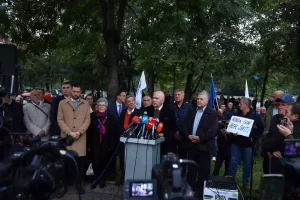Confronting the Tragic Legacy of the Dayton Accords, 1995-2020

David Pettigrew, Ph.D.
Confronting the Tragic Legacy of the Dayton Accords, 1995-2020
As we reflect on the legacy of the Dayton Accords, it should not escape our attention that Bosnia and Herzegovina was the victim, from 1992 to 1995, of international aggression from Serbia and from Croatia. Indictments and convictions at the ICTY have identified Serbian and Croatian nationals as members of Joint Criminal Enterprises responsible for orchestrating the aggression. Milošević was eventually indicted for genocide and other war crimes in 2001 as part of his own designs on “Greater Serbia.” The ICTY found that the criminal enterprise in the Prlić case involved Croatian nationals “whose goal was to permanently remove the Muslim population from Herceg-Bosna.” In spite of eventually being implicated in Joint Criminal Enterprises, both Tudjman of Croatia and Milošević of Serbia were signatories to the Dayton Accords in 1995. Milošević was representing Republika Srpska, by virtue of a “Patriarch Paper,” since Mladić and Karadžić were already indicted for war crimes and were unable to attend. There were, however, representatives of the Bosnian Serbs at Dayton who had not yet been indicted. These included Momčilo Krajišnik and General Zdravko Tolimir. Both Krajišnik and Tolimir were also eventually indicted and convicted of war crimes. Hence, the problematic character of the negotiating team should have provided some foreshadowing of the severe constraints of this deeply flawed peace agreement. It should not be surprising that in the years following the Dayton Accords, both Croatia and Serbia have worked to undermine Bosnia and Herzegovina as a sovereign state. Each has encouraged separatist/secessionist initiatives in Bosnia (Herceg-Bosna and Republika Srpska), arguably pursuing their territorial goals from 1992 by undermining Bosnia's sovereignty with anti-Muslim and nationalist propaganda.
There has also been the internal source of destabilization: Republika Srpska. The founders of Republika Srpska had officially declared the geographic territory of Republika Srpska and sought to secure the territory as ethnically homogeneous. The ICTY determined that there was a common plan “to permanently remove the Bosnian Muslims and Bosnian Croats from Bosnian Serb-claimed territory.” The founders of Republika Srpska carried out their aggression from 1992-1995 against the civilians of Bosnia. However, in spite of the genocidal atrocities the Bosnian Serbs were “rewarded” in the sense that Republika Srpska was recognized and legitimized as an official entity within Bosnia, an entity that would undermine Bosnia's national sovereignty for the next 25 years.
Following the legitimation of Republika Srpska, its authorities have undertaken concerted efforts, in spite of Annex 7, to prevent non-Serbs from returning to the homes from which they were forcibly expelled, thus continuing efforts to achieve the goal of ethnic homogeneity. Such efforts have included the intimidation of returnees through hate speech, genocide denial, the glorification of convicted perpetrators, and suppression of memorials for the victims. In 2014, a plaque glorifying Ratko Mladić, for example, was installed on a hill from which his forces assaulted the civilians of Sarajevo, and in 2016, a plaque commemorating Karadžić was affixed to a student dormitory in Pale. But these plaques pale by comparison to the nationalist monuments glorifying the Serb forces that have been erected across Republika Srpska from Bijeljina to Prijedor, monuments designed by Miodrag Živković that deny the genocide and insult the memory of the victims. These memorials for the perpetrators have had the effect of colonizing the cultural landscape with a revisionist narrative, a narrative that has already affected the next generation as is evident in statements by the new major of Banja Luka–Draško Stanivuković–who denies the genocide and rejects the judgements of the ICTY. In addition, Milorad Dodik undermines Bosnia's existence by challenging decisions of the national court, threatening secession and mocking the High Representative. The leadership of Republika Srpska seeks to prevent Bosnia from functioning as a state, undermining any hope of restorative justice that would lead to reconciliation by denying the geocide and glorifying convicted war criminals. This is part of the tragic legacy of the Dayton Accords.
When I spoke with Richard Holbrooke in a brief conversation in 2009, I identified the recognition of Republika Srpska as a legitimation of a genocidal geography, and as a dehumanizing zone of discriminatory exclusion that continues the founding genocidal impulse by its very existence. I proposed that the political existence of Republika Srpska needed to be challenged through constitutional reform that would reverse that dehumanizing zone of exclusion. He said he agreed with me completely, but he doubted it would be practical. He described the founding leaders of Republika Srpska as opportunists, thugs and criminals. But in his own book To End a War, he had already expressed his frustration with recognition of Republika Srpska, stating that “to divide Bosnia-Herzegovina into two independent parts would legitimize Serb aggression.”
The Dayton Accords attest, then, to the failure of the international community to recognize and stop a genocide in progress, from 1992-1995; the failure to create a just peace at Dayton; and the failure to support state-building in Bosnia in the past 25 years. As Republika Srpska wields genocide denial, challenges to the constitutional court, and threats of secession with impunity, the international community's failure has betrayed the possibility of a meaningful future for the next generation and has undermined the possibility of restorative justice.
As we mark 25 years since Dayton, it is imperative that the international community finally confront this tragic legacy. One crucial initiative would be for the High Representative to use his BONN powers to following through on his promise to implement a law against genocide denial and against the glorification of convicted war criminals. This would be important for the survivors who are traumatized by these threatening and dehumanizing acts. Denial of a genocide is an act of hatred and discrimination, since it minimizes or justifies the barbaric crimes suffered by the targeted group, minimizing not only the crimes but also the suffering, and in this way the denial entails a threat that the crime could be repeated. Such laws in Bosnia would need to criminalize the denial of not only the Srebrenica genocide, but of all war crimes that were committed as well as the glorification of war criminals and celebration of the atrocities. Further, the High Representative should use his BONN powers to authorize survivors to install memorials and memorial centers at atrocity sites such as Omarska, Trnopolje, and Višegrad, where memorials have been suppressed or prohibited. Plaques and monuments glorifying convicted war criminals should be systematically removed. BONN Powers should be used, moreover, to implement reform in the election law to ensure that pre-1992 residents and their descendants be allowed to vote in Srebrenica and other municipalities in Republika Srpska where their right to vote has been violated by genocide.
Finally, it is imperative for the international community to resist and condemn threats of secession and destabilization and to recognize Bosnia's sovereignty by expediting its membership in the European Union and its entry into NATO. A law against genocide denial, provision of memorials for genocide victims, reform of election law, EU membership, and entry into NATO, should be the focused goals now in order to address the tragic legacy of Dayton and to support long overdue state-building in Bosnia, state-building that would provide a framework for constitutional reform and a better future for the next generation in Bosnia.
David Pettigrew, Ph.D.
Professor of Philosophy and Holocaust and Genocide Studies
Southern Connecticut State University
Member Steering Committee Yale University Genocide Studies





